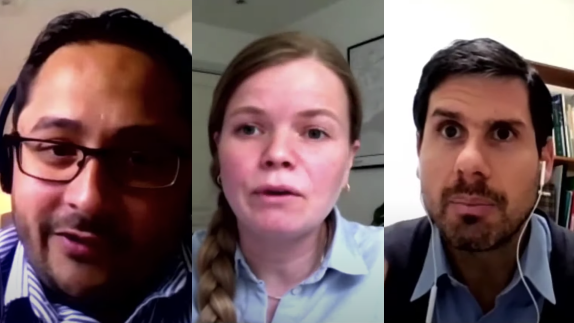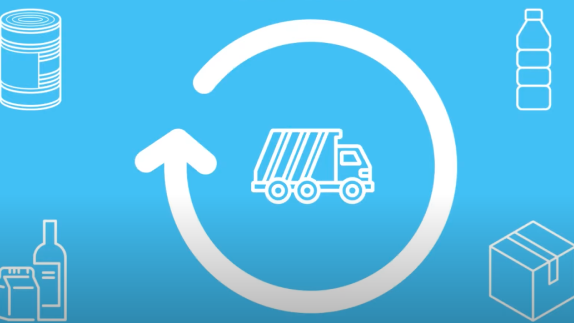To stop packaging pollution we need a circular economy where we eliminate what we don't need, innovate towards new packaging, products and business models, and circulate all the packaging we do use, keeping it in the economy and out of the environment.
But collection, sorting, and recycling of packaging typically costs more to do than the money it makes. Extended Producer Responsibility (EPR) is the only proven and likely way to provide funding that is dedicated, ongoing, and sufficient. Through EPR schemes, companies putting packaging on the market are required to pay for its collection, sorting, and recycling after use.
For the first time, more than 150 leading businesses and other organisations from across the packaging value chain, publicly recognise that without EPR, packaging collection and recycling is unlikely to be meaningfully scaled and tens of millions of tonnes of packaging will continue to end up in the environment every year.
Endorsed by more than 100 leading businesses
including: Beiersdorf, Borealis, Berry Global, Danone, Diageo, DS Smith, Ferrero, FrieslandCampina, H&M, Henkel, Inditex, Indorama Ventures, L'Oréal, Mars, Mondi, Nestlé, PepsiCo, Pick n Pay, Reckitt, Schwarz Group, Tetra Pak, The Coca-Cola Company, Unilever, Veolia, and Walmart.
More than 100 businesses
ACTIAM, Agrecovery Foundation, Albea, Algramo, ALPLA Werke Alwin Lehner GmbH & Co KG, APK AG, APWC, Aquapak Polymers, Archemics , BASF, Beiersdorf AG, BEL Group, BELL Holding , Berry Global, BioPak, BNP Paribas Asset Management, Boomera Brasil Ltda, Borealis AG, Boston Common Asset Management, CCL Label, Cedo, Circularity Capital, Clif Bar & Company, Closed Loop Partners, Coca-Cola FEMSA, Danone, Delphis Eco Ltd, Diageo, Digimarc, Dragon Rouge, DS Smith, Dynapack Asia, Earthwise Group Ltd, Eastman, Eco MYO Cosmetic Cases Inc., Ecoiberia SA, ECOPIXEL / WET Srl, Ecopod Kiosk, ECOR Global, Envases Universales, Enviro Pride, Erno Laszlo, ESG Portfolio Management GmbH, Ferrero, Friesland Campina, Futamura, Gemini Corporation N.V., Greiner AG, H&M Group, Henkel AG & Co. KGaA, Hera Group, INCOM Recycle Co., Ltd., INDITEX, Indorama Ventures PCL, INDUSTRIA MEXICANA DE RECICLAJE S.A. DE C.V, Iönica, James Cropper PLC, John Swire & Sons (HK) Ltd., Kiduara BV, Koepala Packaging, L'Occitane-En-Provence, L'OREAL, Landbell Group, Life Without Plastic, LOLIWARE Inc. , Loop Industries, Lorax EPI, Luhai Pro-environment Inc., Mars Inc, Materiom, Mirova Natural Capital, Mondi, Mr. Green Africa, Myplas, Nestlé SA, Notpla, NOVAPET, Nutramara, PepsiCo, Pick n Pay, Plastic Bank, Plastic Energy, Pöppelmann, Preserve, Reckitt, RecyclePoints, RePack, Rubicon, SAP SE, Schwarz Group, Silafrica Plastics & Packaging Intl Ltd, South Pole, SOVENA, Splosh Ltd, SUST4IN, SWANIA, Swire Coca-Cola Ltd, SYSTEMIQ, TC Transcontinental, Termoencogibles S.A. de C.V. (TERNOVA GROUP), TerraCycle , Tetra Pak, The Better Packaging Co, The Coca-Cola Company, TIPA® Compostable Packaging, TOMRA, Umincorp, Unilever, UPM Raflatac, Veolia, Walmart, Waste Ventures India Private Limited, Waste4Change, Wealth of Flows Consulting Ltd, Werner & Mertz GmbH
More than 50 other organisations
Adrian Dominican Sisters, Portfolio Advisory Board, AGMPM, American Herbal Products Association, APLM - Portuguese Marine Litter Association, As You Sow, Association of Plastic Recyclers, Bioproducts Discovery and Development Centre (BDDC), University of Guelph, Ontario, Canada, Californians Against Waste, Canadian Stewardship Services Alliance, CAPTURE, Congregation of St. Joseph, Daughters of Charity, Province of St. Louise, ECOCE A C, ELISAVA, EPRO, European Investment Bank (EIB), GIZ GmbH, Independent/ UCDavis Industrial Ecology Program, Indian Plastics Institute, Life Cycle Initiative, Mercy Investment Services, Inc., Netherlands Institute for Sustainable Packaging, Oak Foundation, Oceanium, Plant Chicago, Plastic Collective, PLASTIC ODYSSEY, Plastics Recyclers Europe, PREVENT Waste Alliance, Quantis, Recyclers Association of Nigeria, Reusable Packaging Association, Searious Business, Shanghai Rendu Ocean NPO Development Center, Sostenibilidad 3Rs Inc., St. Afvalfonds Verpakkingen (Packaging Waste Fund Foundation), The Green Earth, The Pew Charitable Trusts, The Recycling Partnership, University of São Paulo, WWF, Yunus Environment Hub, Π3=Plastic Pollution Prevention
Supporting quotes
Michael Goltzman, The Coca Cola Company
"We support this statement on the important role that well-designed EPR systems can play in keeping packaging material out of the environment and in the circular economy. Good EPR schemes can motivate businesses and help us achieve our circular economy targets.”
- Michael Goltzman, VP, Global Policy & Sustainability, The Coca Cola Company
Maarten Dubois, Circular Economy, OECD
“Setting up Extended Producer Responsibility schemes creates new markets for recycling. It is challenging to set up but, if successful, it is a game-changer in the global transition towards a circular economy.”
- Maarten Dubois, Project Lead, Circular Economy, OECD
Stientje van Veldhoven, Dutch Minister for the Environment
“In the Netherlands, we see the positive impact of EPR in the value chains where it is implemented. I consider EPR an essential instrument to accelerate the transition towards a circular economy.”
- Stientje van Veldhoven, Dutch Minister for the Environment
Katja Suhr, Marine Litter Prevention, GIZ GmbH
“GIZ highly welcomes this paper on EPR as a means to stimulate the transition to a circular economy worldwide. EPR is needed to translate principles into action and is therefore crucial for a circular economy, contributing to sustainable development.”
- Katja Suhr, Head of Project, Concepts for Circular Economy | Marine Litter Prevention, GIZ GmbH
Kristin Hughes, World Economic Forum
“Extended Producer Responsibility schemes are a vital part of any nation’s path towards achieving a circular plastics economy.”
- Kristin Hughes, Director, Global Plastic Action Partnership and Member, Executive Committee of the World Economic Forum
Andre Nel, Pick n Pay
"We believe mandatory EPR schemes are central to the establishment of a circular packaging economy, in which waste is a valuable resource used to address a range of economic, social and environmental challenges."
- Andre Nel, General Manager of Sustainability, Pick n Pay
Download the Statement and Position Paper
EPR requires all industry players who introduce packaging to the market to provide funding dedicated to collecting and processing their packaging after its use. Without EPR, it’s unlikely that packaging collection and recycling will scale to the extent needed, and tens of millions of tonnes of packaging will continue to end up in the environment every year.
Our Statement and Position Paper, Extended Producer Responsibility - a necessary part of the solution to packaging waste and pollution, sets out why EPR is needed to make the economics work for effective sorting, collection and recycling of packaging materials.






